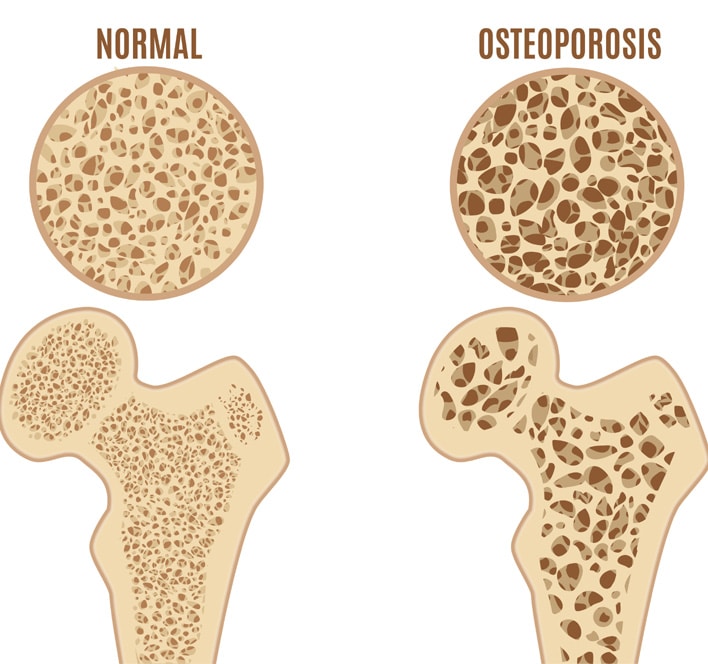Bones are living tissue with important purposes, such as carrying the weight of our bodies, protecting vital organs such as the heart and brain, and they play an important role in blood clotting. Our bones are constantly undergoing changes, but if our bone tissue starts breaking down faster than it builds up, our bones become weak and brittle—a condition known as osteoporosis.
Although osteoporosis is one of the most common conditions affecting people over 50, it can occur at any age. If you or someone you care about is suffering from osteoporosis, it is important to seek medical treatment from a qualified medical professional. At NJ Spine & Orthopedic, one of our board-certified orthopedic specialists can develop a treatment plan that works for you and your lifestyle.
What Are the Possible Causes of Osteoporosis?
Osteoporosis is a serious medical condition that causes bones to lose density, making them thin, fragile, and more likely to break. Unfortunately, it often leads to fractures of the spine, wrists, hips, and ribs.
Doctors have identified several risk factors for osteoporosis. They include the following:
Age
Osteoporosis is most common in older people, but it can occur at any age.
Family History of Osteoporosis
If your parents or grandparents had weak bones, you might be more likely to develop osteoporosis, as well.
Lack of Exercise
Your bones need to be strong enough to support your body’s weight. If not, they will break more easily. Studies have shown that strength training can improve bone density and may even help build new bone tissue.
Inadequate Nutrients Consumed
The foods you eat can affect how well your body absorbs calcium. A diet high in dairy products and vegetables may help prevent osteoporosis by increasing the amount of calcium available for building bones and reducing calcium loss from the body.
Drinking Alcohol
Habitual, substantial consumption of alcoholic beverages can compromise bone health and decrease bone density, increasing your risk of developing osteoporosis.
Smoking
Excessive smoking has been linked with an increased risk of developing osteoporosis later on in life due to its effect on bone health. Smokers tend not only to have lower bone density than nonsmokers but also have higher rates of fractures after sustaining injuries like falls due to weaker bones than nonsmokers.
Menopause
Osteoporosis can strike women at any age, but it is most likely to occur after menopause. This happens because estrogen levels drop after menopause, which makes your bones less dense and more likely to break.
These factors do not necessarily mean that you will develop osteoporosis, as it is possible for people with no risk factors to develop the disease. While some risk factors, such as age and family history, cannot be changed, there are some things you can do to reduce your risk of developing the disease. By making healthy lifestyle choices, such as staying active, eating well, reducing alcohol consumption, and avoiding smoking, you may be able to avoid osteoporosis.
Seek Treatment for Osteoporosis From a Board-Certified Orthopedic Specialist
If you think you may be suffering from osteoporosis, it is important to seek treatment from a board-certified orthopedic specialist who can diagnose your ailment and develop a treatment plan specifically designed for you. At NJ Spine & Orthopedic, our osteoporosis specialists have completed advanced training in diagnosing and treating this disease. Our team is committed to doing what it takes to get our patients as close as possible to living a pain-free life.
Call (866) 553-0612 or submit a completed contact form to begin discussing your treatment options with an NJ Spine & Orthopedic board-certified specialist.

